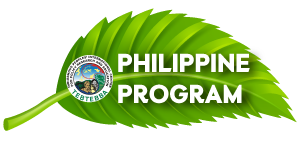
Ms. Victoria Tauli-Corpuz, Tebtebba executive director and former UN Special Rapporteur on the Rights of Indigenous Peoples (first from the left), and Prof. Ricardo Ma. Duran Nolasco, founding chair of 170+ Talaytayan Multilingual Education Incorporated (first from the right), as they hand over certificates of appreciation to Dr. Gina O. Gonong, Undersecretary for Curriculum and Teaching (second from the left), and Mr. Ivan Anthony Henares of UNESCO.
“Ang usapin ng lenggwahe, partikular sa aming mga katutubo, ay isang napakahalagang aspeto. Ito ang nagbubuklod sa amin upang maipagpatuloy namin ang aming pamumuhay sa loob ng aming komunidad. Naisasaayos namin ang mga sigalot gamit ang sarili naming lenggwahe (The discussion about language, specifically for us as Indigenous peoples, is highly essential. Our indigenous language unites us, allowing us to continue our way of life. It enables us to fix different issues and conflicts within our community).”
Johnmart Salunday, Indigenous Peoples’ Mandatory Representative (IPMR) of Puerto Princesa, Palawan in the Philippines and President of Nagkakaisang mga Tribu ng Palawan (NATRIPAL), shared on the importance of their indigenous language during the 2023 Conference-Workshop on Indigenous Languages and the Sustainable Development Goals (SDGs) at the University of the Philippines (UP) Visayas in Iloilo City, Philippines on 21 to 23 February 2023 that was attended by over 300 participants including representatives from indigenous peoples’ organizations, political structures and communities, civil society organizations, the academe, and other relevant actors and stakeholders.
Salunday emphasized how their indigenous language sustains unity among members of their community. He expressed sadness with regard to the arrival of other languages in their community that increasingly impact the speedy resolution of misunderstandings within the ancestral domain. “Ang edukasyon na ito ay isa nga bang oportunidad o isang banta? Nakakalungkot na ang pagpasok ng mga paaralan sa aming lupaing ninuno ay naging hudyat ng malawakang bullying sa aming mga katutubo (Is formal education an opportunity or a threat? It is saddening that the arrival of schools in the ancestral domain resulted in the widespread bullying of us, the indigenous peoples of the area), he shared, adding that some of these schools did not respect the need for free, prior and informed consent (FPIC)—a vital pre-requisite to any undertaking that involve the inclusion of any group of people.
“There is no extra cost for maintaining indigenous language as it is connected to the way of life of the people. Additional costs are very minimal and yet very good investments—the costs of not educating them in their own language would mean them not learning and reaching their own potential, tending to affect their performance and leave school earlier than not," stressed Prof. Fernand de Varennes, United Nations (UN) Special Rapporteur on Minority Issues, asserting that most languages that represented culture were indigenous languages and that “their gradual disappearance have nothing to do with natural processes but with historical colonization resulting to various prohibitions, restrictions and suffocation” as these indigenous languages are often considered “uncivilized’ in the modern world.
Similarly, Gina O. Gonong, current Department of Education (DepEd) Undersecretary for Curriculum and Teaching, placed emphasis on looking into the DepEd programs and allocating dedicated funds for mother tongue-based multilingual education (MTB-MLE) implementation as she cited the present lack of appropriate tools to teach and propagate mother tongue usage in most schools in the country. “Do we have teachers that speak and understand the [specific] language [in the area]? We cannot abandon our rich language diversity—we have to see how we do teacher deployment, how we teach teachers so that they are able to teach Mother Tongue,” she professed.
Aside from comprehensive plenary statements, several parallel sessions were also conducted where numerous presenters discussed their researches in relation to the documentation, revitalization, and preservation of indigenous languages in the different parts of the Philippines. Assigned to lead the event’s Agriculture and Food Security track, several Tebtebba and Ugnayang Pambansa para sa Katutubong Kaalaman at Talino (UPAKAT), Incorporated representatives presented different indigenous food systems in the country and the corresponding indigenous terms used in these, accentuating the necessity of maintaining the practice of these agricultural systems in line with the achievement of the SDGs.
Highlighting the importance of revitalizing indigenous languages, Ms. Victoria Tauli-Corpuz, former UN Special Rapporteur on the Rights of Indigenous Peoples and Tebtebba Executive Director, mentioned the vital role that indigenous peoples had in the proclamation of the years 2022 to 2032 as the International Decade of Indigenous Languages, recalling that it was not an easy thing to achieve. “Without indigenous peoples, this would not have happened,” she declared, pointing out the negative impacts of colonization to indigenous languages. “When indigenous peoples are removed from their territories, their indigenous languages get severely affected. We have to remember that many countries have multiple peoples, multiple languages, and multiple nations,” she said.
The three-day event was co-organized by UP Visayas, Tebtebba, 170+ Talaytayan Multilingual Education Inc, ABC+ Advancing Basic Education in the Philippines, Philippine Normal University, and Lyceum of the Philippines University with support from the United Nations Educational, Scientific and Cultural Organization (UNESCO), United States Agency for International Development (USAID), and Research Triangle Institute (RTI) International. The said gathering was an offshoot of the first one, entitled 2022 Philippine Conference on Indigenous Languages: A Response to the International Decade of Indigenous Languages, that was held at UP Diliman in Quezon City, also in the Philippines, on 25 to 27 October 2022.
Check out the event photos: http://bit.ly/3YME39e
